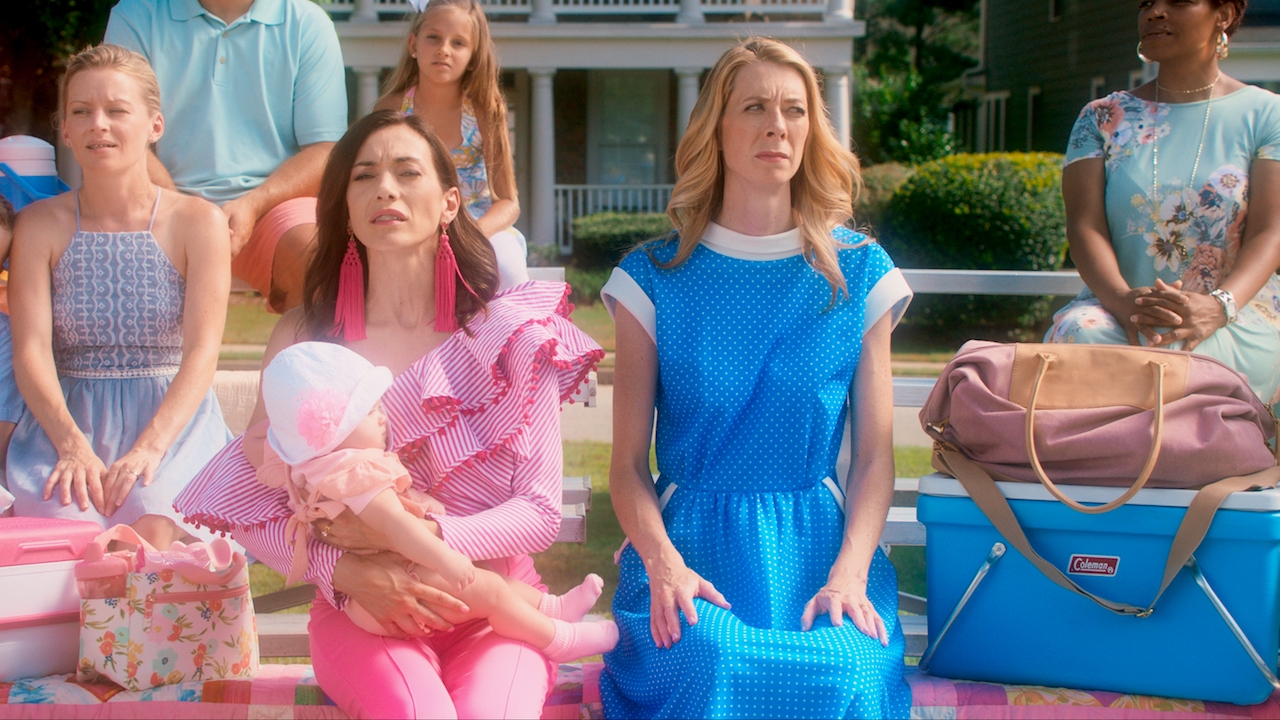This is the first piece in a series of three 2019 Sundance Film Festival coverage articles.
Per usual at the snowy festival, I watched a large variety of films — some pre-determined, some selected because of the buzz they were receiving at the festival — but most of which went above and beyond my expectations.
This year, my coverage focuses on categories of films that all excel, even though other films I saw that didn’t quite fit into any of these — like the sexually-charged “Queen of Hearts,” Viola Davis-led “Troop Zero,” and the controversial Ted Bundy biopic “Extremely Wicked, Shockingly Evil and Vile” featuring Zac Efron — also deserve attention. There was a terrific set of documentary films this year, but I traded off watching those after the festival because many of them already had distribution.
The following films pretty much blew wacky and wild out of the water with the films’ individual premises and originality.
Greener Grass
Watching “Greener Grass” feels like diving into someone’s color-coded fever dream. Jocelyn DeBoer and Dawn Lubbe’s surreal and absurdist comedy isn’t quite experimental, but it transcends reality in an extraordinarily refreshing way — I struggle to pinpoint a similar film that could be compared to it. “Greener Grass” follows two white suburban families — the mothers, the fathers, the children — in their daily lives, and then it goes absolutely off the rails in playing up what can only be described as that eerie brand of soccer mom/yoga mom/businessman dad politeness.
DeBoer and Lubbe (who also wrote and star in the film) lean so far into the white suburbia element and poke fun at themselves that it’s impossible to not be delighted by it all. “Greener Grass” goes far, far beyond simply making fun of suburban white people like soccer moms and khaki-dressed fathers, entitled children and too-pristine neighborhoods in that you never know what’s going to happen next, which is the wonder of the film. It doesn’t linger in pretentiousness or drive home some larger message of the mundanity of white suburbia — it just reaffirms it. Perhaps the best thing about the film is that it doesn’t really attempt a redemption of the stereotypes the film draws upon. It points out and expands on some of the complete absurdity and then runs away, leaving you to figure out what you watched.
Every time you think that the film can’t get stranger, “Greener Grass” slaps you in the face and gives you another level. Plus, it includes cast appearances by comedy favorites including D’Arcy Carden and Beck Bennett.
DeBoer and Lubbe started at Upright Citizens Brigade, the improvisational and sketch comedy training school founded by Amy Poehler and others. “Greener Grass” is absolute proof that we need filmmakers who begin in a variety of disciplines, and I’m excited to see where they go next.
“Greener Grass” is hard to describe unless you watch it. It started as a short film, and you can watch it here and delight yourself. I watched the short after the feature film and you can see where certain concepts were expanded upon and improved — more absurd, more bizarre, more innovative.
If you can’t tell, I’m obsessed with this film.
Imaginary Order
Debra Eisenstadt’s “Imaginary Order” is an extraordinarily bizarre film. It’s not afraid to stretch the boundaries of reality with things that look realistic onscreen but are clearly strange extensions of what feels impossible in real life. It’ll have you laughing out of awkwardness and out of genuinely humorous moments.
But in truth, it’s hard to really pinpoint the crux of the film — it spins out before it finds a point. However, it attempts to make up for it in its strange blend of comedy and melodrama, one moment surprising viewers with conventionally age-inappropriate sexual interactions between struggling characters and breaking the tension with a joke in the next. Ultimately, the film excels most in its style, crafting a creative mix of genres that throws traditional drama for a loop.
Judy and Punch
“Judy and Punch” is an adaptation of a well-known British puppet show (although it’s named Punch and Judy) whose central narrative is not fixed; rather, it hinges upon the power dynamic between Punch as the rowdy, careless (but still controlling!) husband and Judy as the subservient, caring wife. “Judy and Punch” instead passes the power back to the women —and quite literally, resulting in some shocking and bloody scenes, but it’s satisfying nonetheless. Plus, it’s a glorious film to have watched in the theater with its lush period production design.
The film also takes significant liberties with how much the world sticks to reality, alluding to the stock storyboard form of the original story (including a number of amusing CGI moments when characters have physical abilities far beyond what they should in real life). “Judy and Punch” is glorifying when it gives viewers time to sink into their roles as supporters of Judy taking the patriarchy, and it’ll have you cheering in your seats for — in simplest terms — dumping her terrible, abusive husband.
Contact Olivia Popp at oliviapopp ‘at’ stanford.edu.
